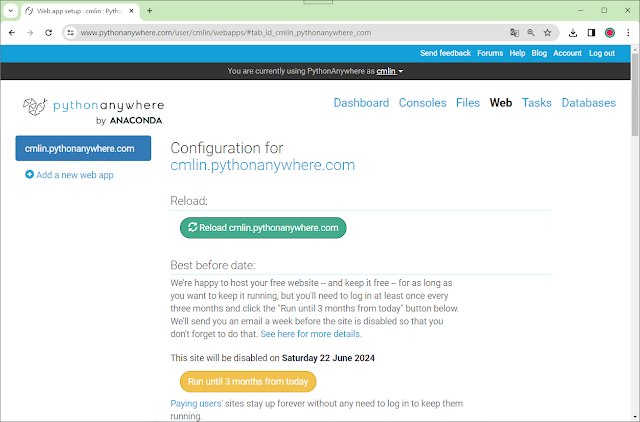對pythonanywhere不熟悉的讀者,請先閱讀這篇文章:善用pythonanywhere開發Django網站
1.建立mysite的Django專案
2.增加template目錄、myapp
3.利用image creator產生蔬菜和水果兩張圖片
4.修訂mysite/settings.py
1 2 3 4 5 6 7 8 9 10 11 12 13 14 15 16 17 18 19 20 21 22 23 24 25 26 27 28 29 30 31 32 33 34 35 36 37 38 39 40 41 42 43 44 45 46 47 48 49 50 51 52 53 54 55 56 57 58 59 60 61 62 63 64 65 66 67 68 69 70 71 72 73 74 75 76 77 78 79 80 81 82 83 84 85 86 87 88 89 90 91 92 93 94 95 96 97 98 99 100 101 102 103 104 105 106 107 108 109 110 111 112 113 114 115 116 117 118 119 120 121 122 123 124 125 126 127 128 129 130 131 132 133 134 | """ Django settings for mysite project. Generated by 'django-admin startproject' using Django 4.0.6. For more information on this file, see https://docs.djangoproject.com/en/4.0/topics/settings/ For the full list of settings and their values, see https://docs.djangoproject.com/en/4.0/ref/settings/ """ from pathlib import Path # Build paths inside the project like this: BASE_DIR / 'subdir'. BASE_DIR = Path(__file__).resolve().parent.parent # Quick-start development settings - unsuitable for production # See https://docs.djangoproject.com/en/4.0/howto/deployment/checklist/ # SECURITY WARNING: keep the secret key used in production secret! SECRET_KEY = 'django-insecure-8c5r7ez2#g2j5n@yxeczdyhw6-zwgj_l64=nark$wc_mn+kf*4' # SECURITY WARNING: don't run with debug turned on in production! DEBUG = True ALLOWED_HOSTS = ['cmlin.pythonanywhere.com'] # Application definition INSTALLED_APPS = [ 'django.contrib.admin', 'django.contrib.auth', 'django.contrib.contenttypes', 'django.contrib.sessions', 'django.contrib.messages', 'django.contrib.staticfiles', 'myapp', ] MIDDLEWARE = [ 'django.middleware.security.SecurityMiddleware', 'django.contrib.sessions.middleware.SessionMiddleware', 'django.middleware.common.CommonMiddleware', 'django.middleware.csrf.CsrfViewMiddleware', 'django.contrib.auth.middleware.AuthenticationMiddleware', 'django.contrib.messages.middleware.MessageMiddleware', 'django.middleware.clickjacking.XFrameOptionsMiddleware', ] ROOT_URLCONF = 'mysite.urls' TEMPLATES = [ { 'BACKEND': 'django.template.backends.django.DjangoTemplates', 'DIRS': [BASE_DIR/'templates'], 'APP_DIRS': True, 'OPTIONS': { 'context_processors': [ 'django.template.context_processors.debug', 'django.template.context_processors.request', 'django.contrib.auth.context_processors.auth', 'django.contrib.messages.context_processors.messages', ], }, }, ] WSGI_APPLICATION = 'mysite.wsgi.application' # Database # https://docs.djangoproject.com/en/4.0/ref/settings/#databases DATABASES = { 'default': { 'ENGINE': 'django.db.backends.sqlite3', 'NAME': BASE_DIR / 'db.sqlite3', } } # Password validation # https://docs.djangoproject.com/en/4.0/ref/settings/#auth-password-validators AUTH_PASSWORD_VALIDATORS = [ { 'NAME': 'django.contrib.auth.password_validation.UserAttributeSimilarityValidator', }, { 'NAME': 'django.contrib.auth.password_validation.MinimumLengthValidator', }, { 'NAME': 'django.contrib.auth.password_validation.CommonPasswordValidator', }, { 'NAME': 'django.contrib.auth.password_validation.NumericPasswordValidator', }, ] # Internationalization # https://docs.djangoproject.com/en/4.0/topics/i18n/ LANGUAGE_CODE = 'en-us' TIME_ZONE = 'UTC' USE_I18N = True USE_TZ = True # Static files (CSS, JavaScript, Images) # https://docs.djangoproject.com/en/4.0/howto/static-files/ STATIC_URL = 'static/' # Default primary key field type # https://docs.djangoproject.com/en/4.0/ref/settings/#default-auto-field DEFAULT_AUTO_FIELD = 'django.db.models.BigAutoField' # default static files settings for PythonAnywhere. # see https://help.pythonanywhere.com/pages/DjangoStaticFiles for more info MEDIA_ROOT = '/home/cmlin/mysite/media' MEDIA_URL = '/media/' STATIC_ROOT = '/home/cmlin/mysite/static' STATIC_URL = '/static/' STATICFILES_DIRS = [ BASE_DIR/'static', ] |
5.修訂mysite/urls.py
1 2 3 4 5 6 7 8 9 10 11 12 13 14 15 16 17 18 19 20 21 22 23 24 25 | """mysite URL Configuration The `urlpatterns` list routes URLs to views. For more information please see: https://docs.djangoproject.com/en/4.0/topics/http/urls/ Examples: Function views 1. Add an import: from my_app import views 2. Add a URL to urlpatterns: path('', views.home, name='home') Class-based views 1. Add an import: from other_app.views import Home 2. Add a URL to urlpatterns: path('', Home.as_view(), name='home') Including another URLconf 1. Import the include() function: from django.urls import include, path 2. Add a URL to urlpatterns: path('blog/', include('blog.urls')) """ from django.contrib import admin from django.urls import path from myapp.views import index, vegetable, fruit urlpatterns = [ path('admin/', admin.site.urls), path('', index), path('vegetable/', vegetable), path('fruit/', fruit), ] |
6.修訂myapp/vews.py
1 2 3 4 5 6 7 8 9 10 11 | from django.shortcuts import render # Create your views here. def index(request): return render(request, 'index.html', locals()) def vegetable(request): return render(request, 'vegetable.html', locals()) def fruit(request): return render(request, 'fruit.html', locals()) |
7.新增templates/index.html
1 2 3 4 5 6 7 8 9 10 11 12 13 14 15 | <!DOCTYPE html>
<html>
<body>
<h1>虎科小農超市</h1>
<p>虎科大是一所很重視永續發展暨社會責任的大學</p>
<nav>
<a href="/vegetable/">蔬菜</a> |
<a href="/fruit/">水果</a> |
</nav>
</body>
</html>
|
8.新增template/vegetable.html
1 2 3 4 5 6 7 8 9 10 | <!DOCTYPE html>
<html>
<body>
<h1>蔬菜</h1>
<img src='../static/images/vegetable.jpg'>
</body>
</html>
|
9.新增templates/fruit.html
1 2 3 4 5 6 7 8 9 10 | <!DOCTYPE html>
<html>
<body>
<h1>水果</h1>
<img src='../static/images/fruits.jpg'>
</body>
</html>>
|
10.重新整理,按下下圖Reload,再按下URL來查看結果
11.執行結果








沒有留言:
張貼留言